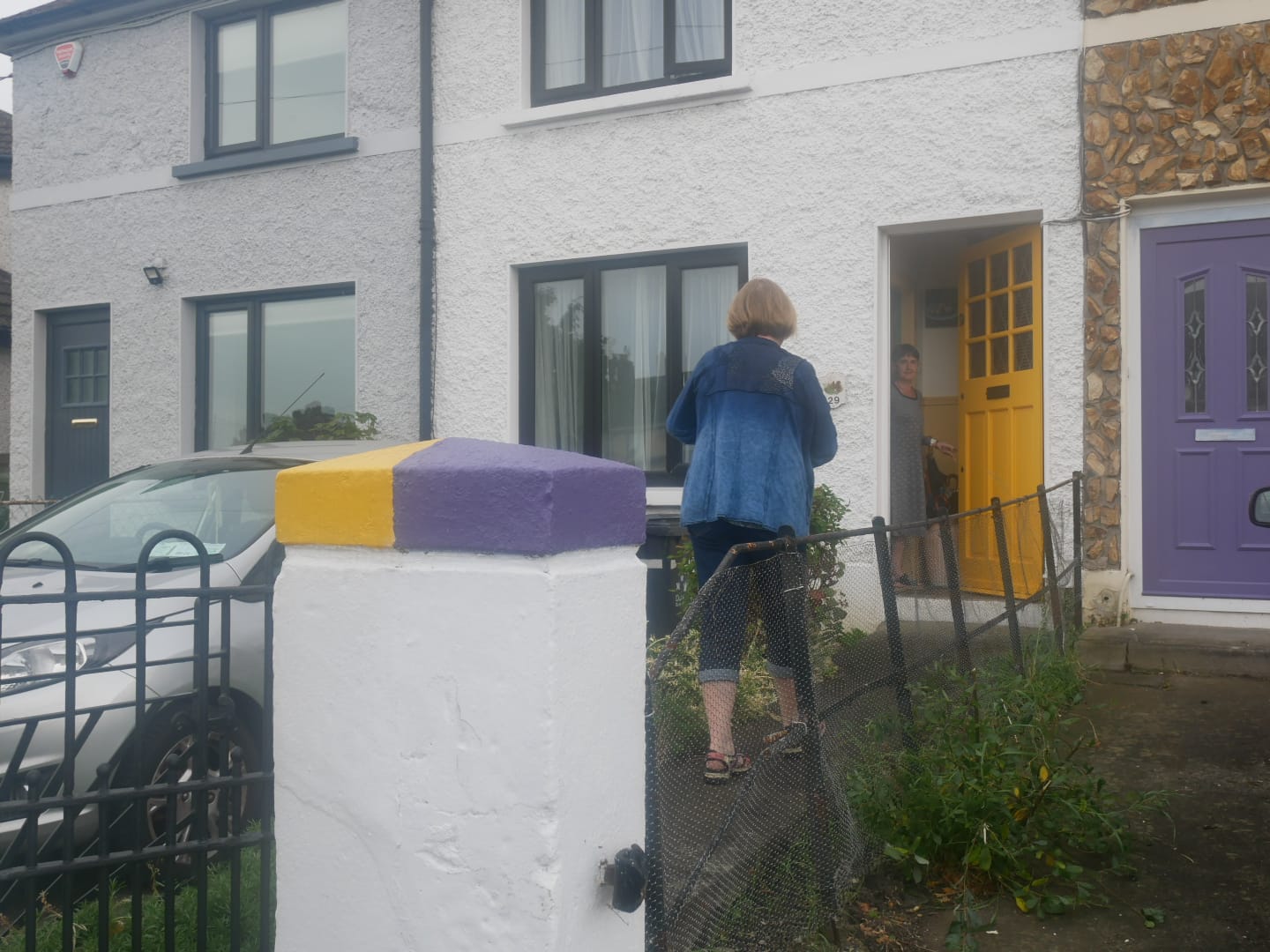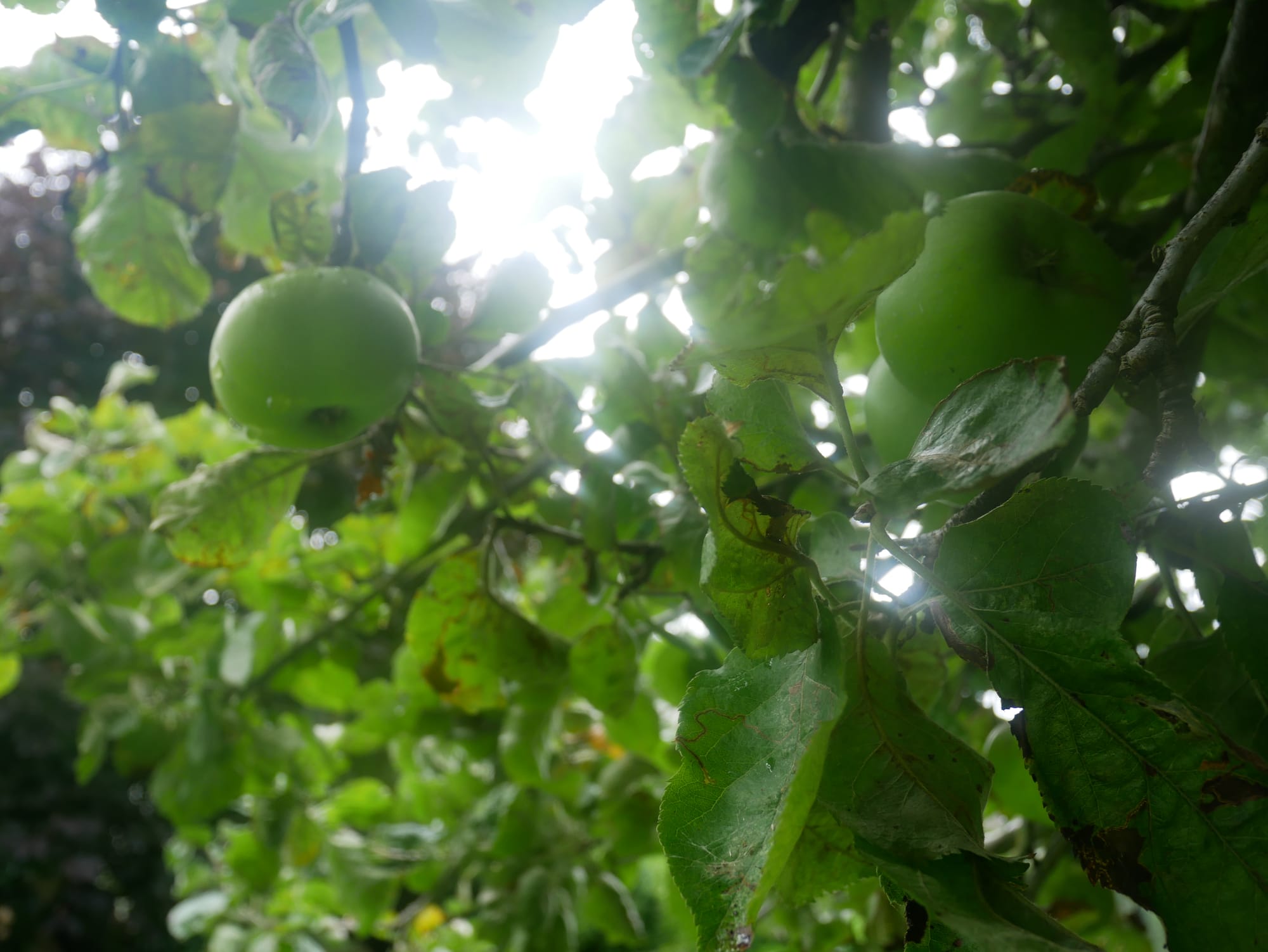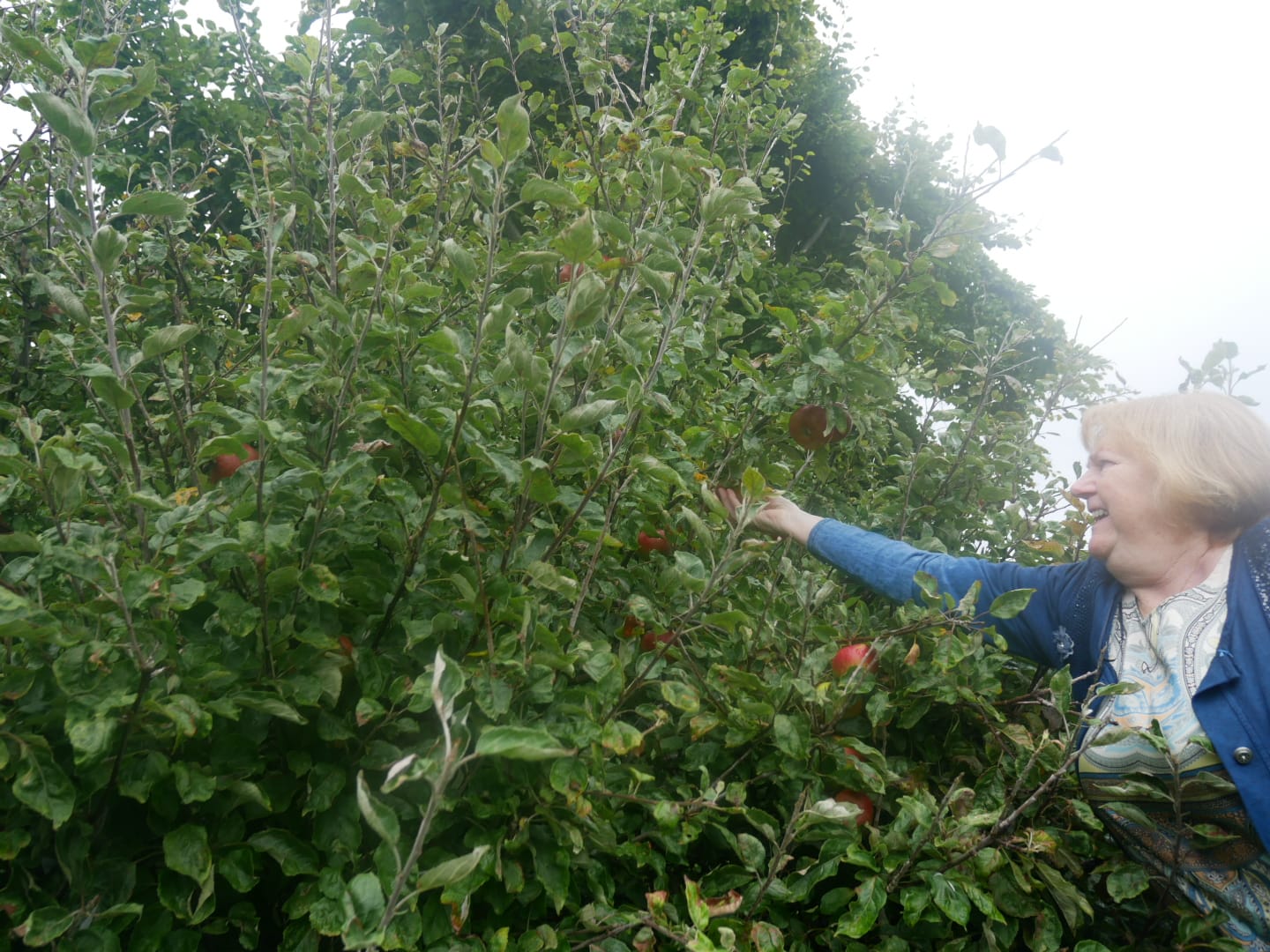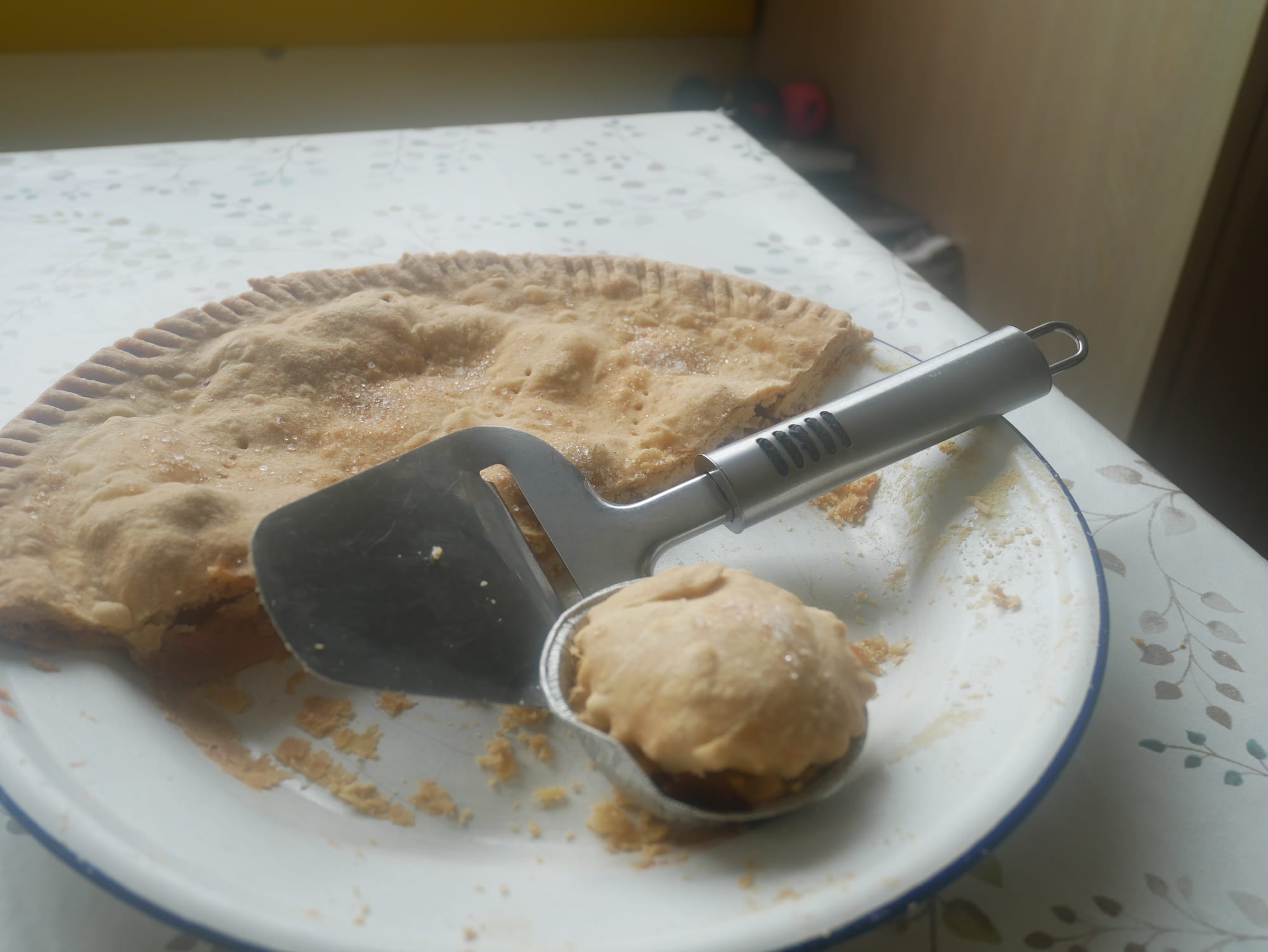What’s the best way to tell area residents about plans for a new asylum shelter nearby?
The government should tell communities directly about plans for new asylum shelters, some activists and politicians say.
Last year, her knitting group had a code on WhatsApp, says Ailish Scanlon: a hand emoji if you’d be at the next meeting, and an apple if you needed apples.

Ailish Scanlon picks through the apples scattered on the draining board. Some small and bright green and others marked with a gentle blush of red.
She chooses a few, and washes and dries them, and wraps them in a twist of paper, reaching over to add them to the bags ready on the counter top on the other side of the kitchen sink.
Some of her neighbours are busy folk. They might not use the apples for a few days, she says. That’s why she wraps each one up, she says. If one rots, they won’t all turn.
“One apple could go off, which would spoil the whole lot,” she says. “I just wish we could use more and more of what we do grow in Ireland.”
Outside the window of her semi-detached Terenure home, midway down her long garden with its shiny barbecue and a big old trampoline and tidy greenhouse, are two big old apple trees.
One drips with cooking apples, the other with apples for eating. Last year, she didn’t quite get through the harvest, she says. She had to dump the last of them.
She isn’t alone.
Hundreds of fruit trees across Ireland are left unpicked each year, according to Falling Fruit Ireland, which sends volunteers to harvest them. And in commercial orchards, 15 percent of fresh apples are lost to storage rot and disease, according to an Environmental Protection Agency report published last year.
Once September draws in, Scanlon rarely leaves the house without as many apples as she can carry.
If she hops into the car, she can take four or five bags. “But even on the bicycle, which I normally go around by bicycle, I’d have a bag of apples on my back. Just in case I bump into somebody,” she says.
Last year, Scanlon’s knitting group had a code on WhatsApp: a hand emoji if you’d be at the next meeting, and an apple if you needed apples.
Last Thursday, Scanlon pulled up in her car outside a row of pebbledash houses, a five-minute drive from her home. She jumped out and popped the boot, and grabbed one of the bags.
Up a short sloped path, a bright yellow door opens just before she reaches it.
“I’ve brought you a bag of apples,” Scanlon says.
Inside, Anne Spain shows the deep brown chutneys she made with the last batch she got. Glass jars and gingham lids and handwritten labels.
She hasn’t bought apples for years, she says. “Why would I?”

At her next stop nearby, a red-brick terrace home in Terenure’s Ashfield Park, Scanlon clanks the door knocker three times and presses at the buzzer. Never sure, she says, if the bell works.
“Oh my God, more apples!” says Valerie Frizzelle, in the hallway. “Oooh, great!”
The first batch are nearly gone, she says – baked into three big pies for the neighbourhood street party.
People love pies, says Frizzelle. “Men especially. It’s like men with beans. And with dessert, it’s apple pie.”
In the kitchen, she brings out a handful. “I’ve just four left.”
She lays the kitchen table with a coffee press and cups. A knitted Michael Tea Higgins cosy sits on the window sill. The spoon chinks as she stirs.
Frizzelle makes apple pies and apple crumble, she says. If there’s too many, she stews them into an apple sauce and freezes it, she says. “I did an apple chutney, but it didn’t turn out … I loved it!”
“It’s hard not to open it for four weeks,” says Scanlon.
“I think that was my problem,” Frizzelle says. “I’m overzealous.”
In Inchicore, Peadar Rice offers one solution to backyard surplus.
Customers can swap their harvests for store credit, he said on Friday, leaning on the counter of Small Changes, his grocery store on Emmet Road.
He came up with the idea more than a decade, and a few stores, ago. He was living in Gorey and had a garden, he says. “There was only so many times I could knock on my neighbours, and say heeeey, want some veg?”
Growers get the day’s market rate for whatever they bring in, he says. “This year, we’ve had butternut squashes, aubergines, tomatoes, lots of courgettes, rhubarb, cucumbers.”
They don’t take apples that have fallen, Rice says. They’re more likely to be bruised and turn. But freshly picked ones are sound.
Rice nods towards a box propped up with the veg and fruit display. “Cooking apples that are down there, they’re from just down the road.”

Others struggling to harvest their trees call Falling Fruit Ireland to ask for help, says Bernie Brannick, a founder.
They’ve already started this season, she says. “It’s well underway.”
Volunteers pick the fruit and the owner gets a share, and the rest goes to local charities or groups who want them.
Most goes to FoodCloud, the social enterprise tackling food waste, she says. But she may offer it also on Olio, the food-sharing app, and to local zero-waste groups on Facebook, she says. “If the donor agrees.”
People are generally just happy that it isn’t rotting, she says.
There’s something about the personal, though. Last year, she put out a box of fruit in the foyer of her apartment building, Brannick says. “I love the idea of people sharing with their neighbours.”
Scanlon and apples go way back, she says. “My relationship with apples starts before I was born.”
Her grandparents on her mother’s side were fruit importers in Donegal. “They had trucks that came down to Dublin to Smithfield, filled up with, a lot of the time apples, and oranges.”
They traded up to the early 1970s, she says.
Fresh fruit would have been a big treat for most children growing up at the time in Donegal, she says. But she and her siblings had it all the time.
Scanlon remembers her grandmother asking her to help bring in boxes of bananas to ripen by the fire, she says.
She remembers all the boxes that would arrive, she says, but especially the apples. “For some reason, I remember the apples.”

When she was five, the family moved to a bigger farm with an orchard. It had pear trees and plum trees and a Granny Smith apple tree, and a crabapple tree and cooking-apple trees.
“We were never without apples,” she says.
Her mother would make apple and blackberry jelly. And an apple and blackberry wine, she says laughing. Well, kind of.
“We used to go into school saying, ‘We had wine last night,’” says Scanlon. “It was just … obviously, there was no alcohol in it.”
She moved to Dublin when she was 18, Scanlon says, and had the young free years of work and play and travel. But the apples found her again.
When Scanlon was pregnant, in 1994, they were living in Royston. A gardener friend said he would plant a tree for the child.
“I said, ‘In that case, I want an apple tree,’” Scanlon says.
June, though, was not a great time for planting so he said he would do it later. July came around, and August passed too, and the months rolled on.
Eventually he came by on 4 December, she says, and asked where he should plant it, a Red Devil tree. “And I was like, ‘Oh throw it wherever you want.’”
“Just as he came into the house, I got the first pangs of labour,” she says. Her son was born the next day.
In 1998, they moved into the home where they live now, on a road of semi-detached red-bricks on the edge of Terenure. It was rundown, she says, but out in the long back garden were two apple trees.
“The two apple trees have been there all along,” she says.
They might be remnants from an old farm, says Scanlon. “A dairy farm.”
She knows there used to be one here. She dug up a massive tooth in the garden one day, she says, and hoped it was from a dinosaur.
She wrote to academics at University College Dublin. It came from a Clydesdale horse, they told her, the kind that would have clopped the milk into town.
Not a T-rex after all, said Scanlon, ruefully, earlier this summer glancing out of the window at the waving trees and the rain, and the grass and a stripe of path. “I wasn’t even thinking a big dinosaur, I was thinking a small dinosaur.”
Mangoes or passion fruits are tasty enough. “I don’t think those fruits are as versatile, though, as apples,” says Scanlon.
Whether you boil it or fry it or bake it, it keeps its nutrition, she says. Consider the taste too, says Scanlon. It’s strong enough to add flavour but not to overpower. And, she says, they’re grown here.
“I put apples into nearly everything,” she says.
She might simmer the apples down into a syrup to drizzle on porridge or mix it into stuffing for chicken, she says, or stir a bit to add some sweet to a sweet and sour.
She might bake them into a tray of muesli bars or a soft apple sponge. Add blackberries or rosehips and make into jam. Wrap them into a thin-crust apple pie – gotta watch the calories – with a giant blob of cream.

“I just think it’s sad that children these days don’t realise where food comes from,” said Scanlon last Thursday, sat at one end of the table in the narrow kitchen at the back of Frizzelle’s house.
A kid asked her once, as she picked blackberries by the Dodder, what she was doing, she says. She planned to make a pie, she told them. “They were like, ‘But how do you know that you can eat them?’”
Frizzelle, with glossy white hair and gold-rimmed glasses, nods along.
When she was a kid, she lived in a tight community in what were known as the key holes in Drimnagh, she says. “The shape of a key, a roundabout and one road in.”
“And everybody, every second house, had apple trees,” says Frizzelle.
As kids, they used to band together and try to rob the back-yard orchards, she says. “It was such fun, though.”
She remembers her mother coming out onto the street one evening to find them all hunkered down with a big bag of apples, cores and apple bits strewn around.
“We were chuffed with ourselves for robbing Kelly’s orchard,” she says. That was a neighbour’s house with three apple trees, she says.
Her mum marched them back over to the crime scene, she says, and asked Mr Kelly if he wanted his windows washed or his car maybe, or anything done on the coming Saturday. There were some kids available, she told him.
Mr Kelly set them to work harvesting the trees, says Frizzelle.
At about 1.40pm, Scanlon knocked on a brown door at the base of Markievicz House on Townsend Street, an old block of social flats amid shiny office blocks in the heart of the city.
“I like the apple sponge,” says Kathleen Delamere, resting now in a big armchair in the corner of her sitting room.
That’s what she would often make. She would simmer the apples gently, and strain off the juice, and put them in the middle of a bit of pastry, and top it with a batter. “And it’s lovely, apple sponge.”
“I don’t believe in putting them in raw,” says Delamere, of the apples.
“It’s hard to get right, but it is lovely,” says Scanlon.
Against one wall is a giant mahogany case filled with framed photos of faces and frocks, graduations and weddings and special occasions.
Delamere, now 95 years old, has four daughters and a son. “Twenty-five great-grandchildren” too, she says.
It’s been a good 20 years since Scanlon first dropped off apples here. “You probably don’t remember, Kathleen,” says Scanlon.
One of the first years Scanlon was married, the couple were in Dublin for St Patrick’s Day. They met up with her husband’s brother and wife, she says – one of Delamere’s daughters.
“They were coming to you for dinner,” says Scanlon. “And they were like, ‘Kathleen won’t mind.’ And we came to you as well.”
“I remember that day you had lovely apple tarts,” says Scanlon. “So the following September I was in town, and I thought, ‘I must bring Kathleen a bag of apples. She won’t let them go to waste.’”
Get our latest headlines in one of them, and recommendations for things to do in Dublin in the other.